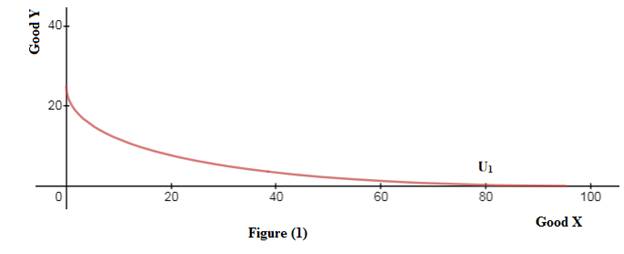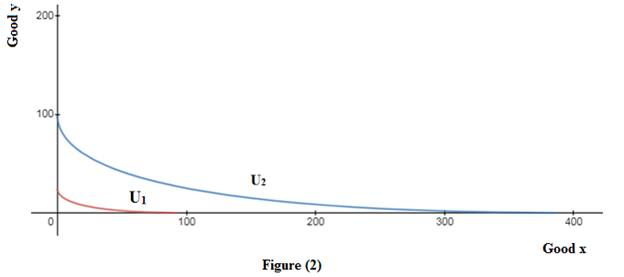
(a)
Whether the assumption that more is better satisfied for both the goods, x and y or not.
Explanation of Solution
The consumer prefers two goods x and y.
The utility function of the consumer is given as follows-
Also,
The additional utility derived from the consumption of additional unit of good is known as marginal utility.
Since, MUx> 0 and MUy> 0. The assumption that more is better is satisfied for both the goods.
(b)
Whether the marginal utility good x diminishes, remain constant, or increase as the consumer buys more units of good x.
Explanation of Solution
Differentiate (1) with respect to x to determine whether the marginal utility good x diminishes, remain constant, or increase as the consumer buys more units of good x.
As,
Thus, it can be concluded that marginal utility of good x diminishes as the consumer buys more units of good x.
(c)
Marginal rate of substitution of the two goods, x and y.
Explanation of Solution
The rate at which consumer is willing to sacrifice some units good x to get an additional unit of good y is known as marginal rate of substitution (MRS).
MRSx,y, is equal to the ratio of the marginal utility of good x to the marginal utility of good y.
(d)
Whether marginal rate of substitution of the two goods, x and y diminishes, remain constant, or increase as the consumer substitutes x for y along an indifference curve.
Explanation of Solution
Differentiate (3) with respect to x to determine whether marginal rate of substitution of the two goods, x and y diminishes, remain constant, or increase as the consumer substitutes x for y along an indifference curve.
As,
Thus, it can be concluded that marginal rate of substitution of the two goods, x and y diminishes, as the consumer substitutes x for y along an indifference curve.
(e)
A typical indifference curve of the given utility function.
And whether the curve intersects X-axis or Y-axis or not.
Explanation of Solution
The figure (1) below depicts a typical indifference curve U1. The declining slope of the curve represents diminishing MRSx, y.

The indifference curve U1 both the axis.
(f)
The second indifference curve U2, with U2> U1.
Explanation of Solution
The figure (2) below represents second indifference curve U2. Here, U2 > U1.

Want to see more full solutions like this?
Chapter 3 Solutions
EBK MICROECONOMICS
 Exploring EconomicsEconomicsISBN:9781544336329Author:Robert L. SextonPublisher:SAGE Publications, Inc
Exploring EconomicsEconomicsISBN:9781544336329Author:Robert L. SextonPublisher:SAGE Publications, Inc Principles of Economics 2eEconomicsISBN:9781947172364Author:Steven A. Greenlaw; David ShapiroPublisher:OpenStax
Principles of Economics 2eEconomicsISBN:9781947172364Author:Steven A. Greenlaw; David ShapiroPublisher:OpenStax







